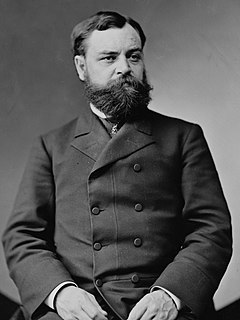John S. Goff (1931-2001) was a college professor who studied Robert Todd Lincoln and the history of Arizona. He was active in historical organizations.
Contents

John S. Goff (1931-2001) was a college professor who studied Robert Todd Lincoln and the history of Arizona. He was active in historical organizations.

Goff was born in Los Angeles, California, on June 20, 1931, to Samuel J. Goff and Elizabeth A. Wilhelm Goff and graduated from Inglewood High School in Inglewood, California, in June 1949, after which he attended Pepperdine College on its campus in Los Angeles. [1] [2] [3] [4] He graduated from the University of Southern California, where he also received a doctorate of philosophy in history. [5] He died on April 8, 2001, and was survived by his mother; a daughter, Margaret Elizabeth Goff, and a son, John Swafford Goff, all of Phoenix, Arizona. [4] [5]
In July 1957 Goff was appointed as an instructor in government and history at West Texas State College in Canyon, Texas. [3] In 1960, he next taught at Phoenix College, where he was head of the Social Sciences Department and director of the Paralegal Program. [5] He lived in Phoenix. [4] He wrote books on Arizona history and the Abraham Lincoln family, and he edited the records of the Arizona Constitutional Convention of 1910. [5] Goff was a member of the State Bar of Arizona and the Arizona Academy and was a director of the Arizona Historical Foundation and the Central Arizona chapter of the Arizona Historical Association. [5] He was a member of Phi Alpha Theta, national history fraternity; Pi Sigma Alpha, and Pi Kappa Delta. [3]
Goff wrote for the Microsoft Encarta Encyclopedia. He also authored a series of articles about Arizona territorial officials. [5]
In 1985, Goff was chosen by the Illinois State Historical Library to have the first access to the twenty thousand letters which Robert Todd Lincoln wrote between 1860 and 1920 and which were discovered in 1982. They had never been studied. Goff said he would revise his already-printed book on the younger Lincoln and hoped to have the work completed in 1987. [7]

The Southwestern United States, also known as the American Southwest or simply the Southwest, is a geographic and cultural region of the United States that generally includes Arizona, New Mexico, and adjacent portions of California, Colorado, Nevada, Oklahoma, Texas, and Utah. The largest cities by metropolitan area are Phoenix, Las Vegas, El Paso, Albuquerque, and Tucson. Prior to 1848, in the historical region of Santa Fe de Nuevo México as well as parts of Alta California and Coahuila y Tejas, settlement was almost non-existent outside of Nuevo México's Pueblos and Spanish or Mexican municipalities. Much of the area had been a part of New Spain and Mexico until the United States acquired the area through the Treaty of Guadalupe Hidalgo in 1848 and the smaller Gadsden Purchase in 1854.

Robert Todd Lincoln was an American lawyer, businessman, and politician. He was the eldest son of President Abraham Lincoln and Mary Todd Lincoln. Robert Lincoln became a business lawyer and company president, and served as U.S. Secretary of War and U.S. Ambassador to the United Kingdom.

Phoenix College (PC) is a public community college in Encanto, Phoenix, Arizona. Founded in 1920, it is one of the oldest community colleges in the country.

The history of Arizona encompasses the Paleo-Indian, Archaic, Post-Archaic, Spanish, Mexican, and American periods. About 10,000 to 12,000 years ago, Paleo-Indians settled in what is now Arizona. A few thousand years ago, the Ancestral Puebloan, the Hohokam, the Mogollon and the Sinagua cultures inhabited the state. However, all of these civilizations mysteriously disappeared from the region in the 15th and 16th centuries. Today, countless ancient ruins can found in Arizona. Arizona was part of the state of Sonora, Mexico from 1822, but the settled population was small. In 1848, under the terms of the Mexican Cession the United States took possession of Arizona above the Gila River after the Mexican War, and became part of the Territory of New Mexico. By means of the Gadsden Purchase, the United States secured the northern part of the state of Sonora, which is now Arizona south of the Gila River in 1854.

Sigma Alpha Iota (ΣΑΙ) is a women's music fraternity. Formed to "uphold the highest standards of music" and "to further the development of music in America and throughout the world", it continues to provide musical and educational resources to its members and the general public. Sigma Alpha Iota operates its own national philanthropy, Sigma Alpha Iota Philanthropies, Inc. Sigma Alpha Iota is a member of the National Interfraternity Music Council and the Professional Fraternity Association.

James Walter Douglas was a Canadian born mining engineer and businessman who introduced a number of metallurgical innovations in copper mining and amassed a fortune through the copper mining industry of Arizona and Sonora.

Charles Debrille Poston was an American explorer, prospector, author, politician, and civil servant. He is referred to as the "Father of Arizona" due to his efforts lobbying for creation of the territory. Poston was also Arizona Territory's first Delegate to the U.S. House of Representatives.

Richard Elihu Sloan was an American jurist and politician, who served as Associate Justice of the Arizona Territorial Supreme Court, a United States district judge of the United States District Court for the District of Arizona and as the 17th and final Governor of Arizona Territory. As an Associate Justice he served for 16 years, the longest service of any member of the Arizona Territorial Supreme Court, and wrote over 150 legal opinions. As Governor he oversaw Arizona's transition from territory to statehood.

The Sunnyslope community is an established neighborhood within the borders of the city of Phoenix, Arizona. The geographic boundaries are 19th Avenue to the west, Cactus Road to the north, 16th Street to the east, and Northern Avenue to the south. This area covers approximately nine square miles (23 km2) and is divided into nine census tracts. The Sunnyslope community is included in parts of three zip code areas: 85020, 85021 and 85029.

The 2003 Air Force Falcons football team represented the United States Air Force Academy in the 2003 NCAA Division I-A football season. They were a member of the Mountain West Conference. The Falcons were coached by Fisher DeBerry and played their home games at Falcon Stadium. They finished the season 7–5, 3–4 in Mountain West play to finish in a three-way tie for fourth place.
John Y. T. Smith was an American businessman and politician who became the first non-Indian to live in what would become Phoenix, Arizona. He served three times as a member of the Arizona Territorial Legislature, becoming Speaker of the House during his final term, and was appointed to a two-year term as Territorial treasurer.

Rose Eudora Collom was an American botanist and plant collector. She was the first paid botanist of the Grand Canyon National Park. She discovered several plant species, some of which were named in her honor, and collected numerous plant specimens.

The 1918 Arizona gubernatorial election took place on November 5, 1918, for the post of the Governor of Arizona. Thomas Campbell, who served a partial term in 1917 and had his election overturned by the Supreme Court of Arizona, returned to contest the Governors office. Incumbent Governor Hunt declined to run again after the stress of the close elections and the year-long court battle. Despite falling to its lowest percentage in years, the sole third party challenger held the difference between the two candidates. The Democratic challenger was state senator Fred T. Colter, a pro-Hunt Democrat.

Webster Street was an American jurist who served as Chief Justice of the Arizona Territorial Supreme Court from 1897 till 1902.
Henry Clay Gooding was an American jurist who served as Chief Justice on the Arizona Territorial Supreme Court from 1890 till 1893.
J. Eugene Grigsby was a multimedia artist and educator. His primary mediums were printmaking and painting; his style of painting was abstract and expressionistic. Grigsby was an influential educator for both college and high school students. He was also heavily involved with community programs focused on uplifting lower socio-economic communities.

Greenwood Memory Lawn Mortuary & Cemetery is the official name given to a cemetery located at 2300 West Van Buren Street in Phoenix, Arizona owned by Dignity Memorial. The cemetery, which resulted as a merger of two historical cemeteries, Greenwood Memorial Park and Memory Lawn Memorial Park, is the final resting place of various notable former residents of Arizona. Pioneers, governors, congressman, government officials, journalists, race car drivers, soldiers, actors and actresses are among the many notable decedents who are interred in the cemetery.
Dr. Winston Clifton Hackett (1881–1949) was the first African American physician in Arizona. He was the founder of the Booker T. Washington Memorial Hospital, the first hospital in Phoenix which served the African American community.

Gamma Alpha Chi (ΓΑΧ) was a professional advertising fraternity for women founded in 1920.